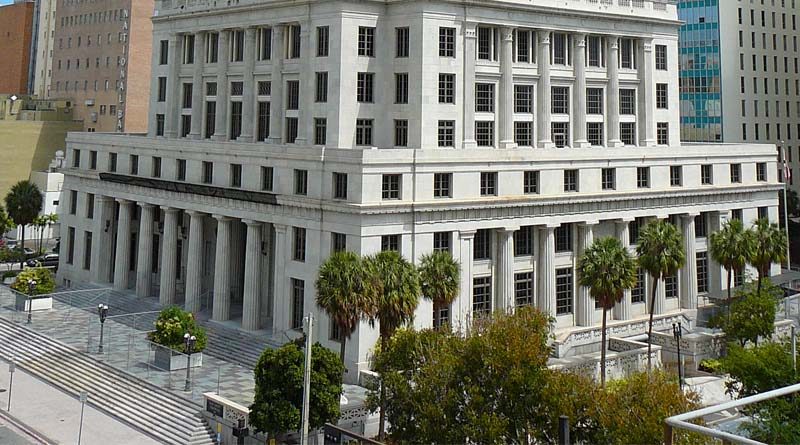Florida County Close to Approving New Courthouse
By Lisa Kopochinski
MIAMI DADE, Fla.—After years of false starts, Miami-Dade County is a vote away from approving a new $267 million civil courthouse.
County Commissioners were scheduled to vote on the proposal on December 3, but this has been postponed until mid-December.
The new courthouse would be built in downtown Miami. However, the courthouse plan requires approval from the Federal Transit Administration since part of the proposed site—a parking lot under a Metrorail track between Flagler and Northwest 1st Street—is tied to federal transportation funds. The FTA has not yet granted approval, so the vote was moved to the December 17 commission meeting, a Plenary Group spokeswoman said.
The Miami Herald reported that approving the winning bid by developer Plenary Group would finally hand Miami-Dade a financial path to replacing a courthouse so old that it once housed a trial for Al Capone.
Formerly known as the Dade County Courthouse, this historic courthouse was constructed over four years from 1925 to 28. It stands 361 feet tall with 28 floors. When it was built, it was the tallest building in Miami and in Florida. In 1989, it was added to the U.S. National Register of Historic Places.
Miami-Dade would get a larger replacement courthouse located next door to the historic building that continues to be burdened by maintenance issues, closed courtrooms and complaints of dated, cramped facilities. The new courthouse will be larger, with 50 courtrooms instead of the existing 23.
The planned vote comes five years after Miami-Dade voters rejected a proposed tax increase to fund a new courthouse, hampering financial options that the administration of Mayor Carlos Gimenez said still have not been resolved.
The Miami Herald reported that the new 23-story building would be constructed using private funds put up by Plenary, which then would operate the facility under a 30-year county contract worth an average of $27 million a year. Miami-Dade expects to pay approximately $850 million to Plenary by 2053. Plenary Justice Miami, the entity proposing the plan, is part of Plenary Group, a developer based out of Australia with headquarters in Canada as well.
Under this arrangement, Plenary would see its yearly payments reduced if it falls short on dozens of operational and maintenance standards, including backup power not working during an electrical outage, failure to lower a courthouse flag during a period of public mourning, and falling behind on scheduled maintenance throughout the building.
This public-private partnership is designed to link a developer’s profits with a project’s long-term functionality, since Plenary would receive less money if the 640,000-square-foot building performs poorly.
Plenary Vice President Mike Schutt said, in a statement, that the arrangement forces the company to invest in regular upkeep of the building long-term, rather than face financial penalties if conditions are allowed to deteriorate.
Miami-Dade plans to offer the existing courthouse for developers interested in transforming the historic building into a commercial use, such as a hotel or office building.

